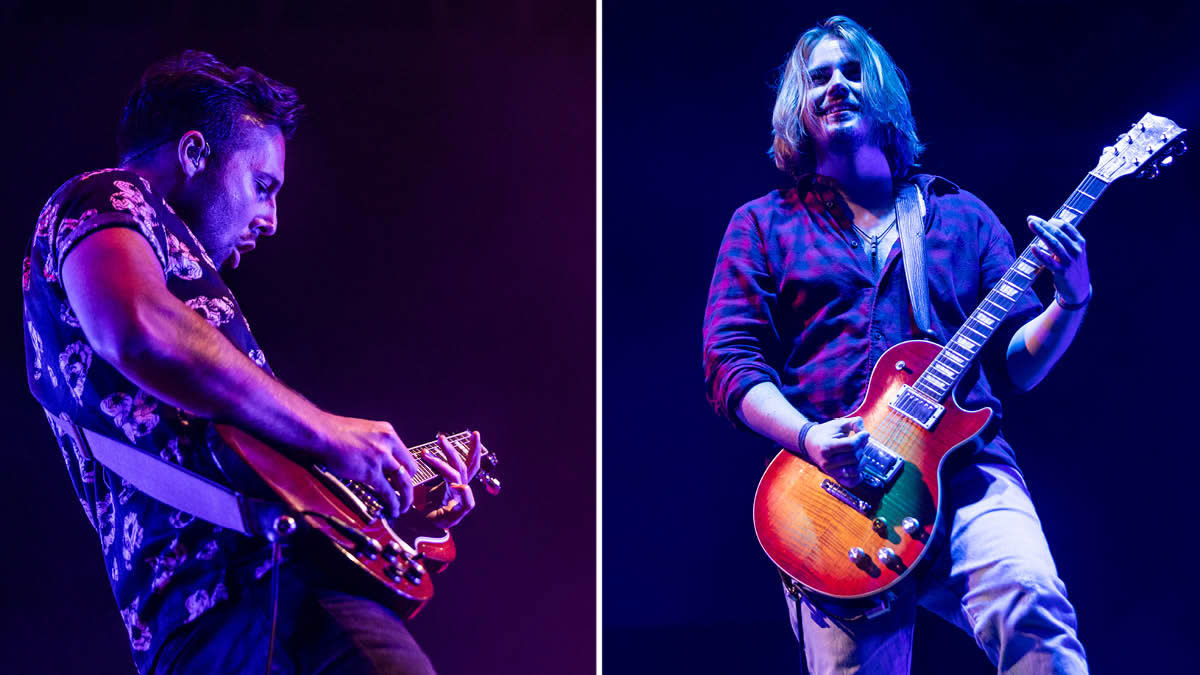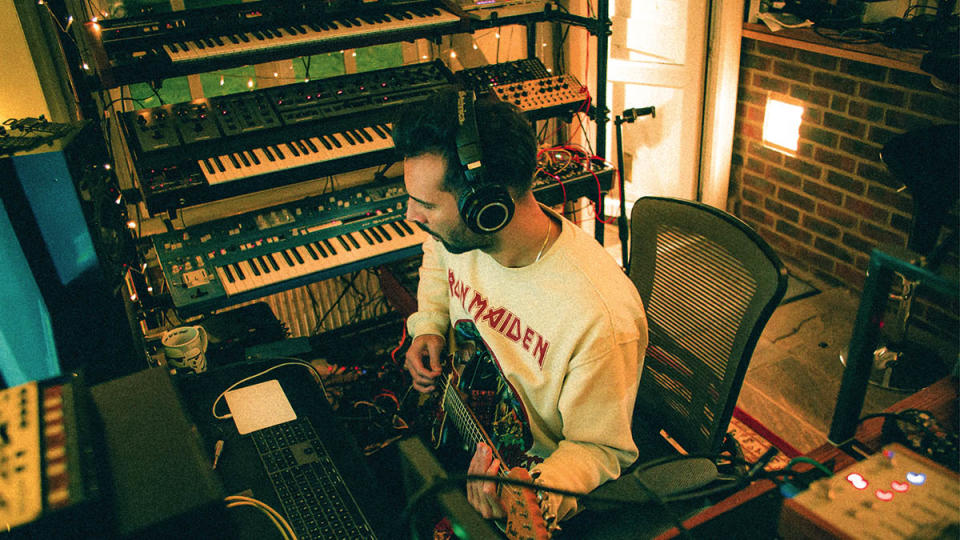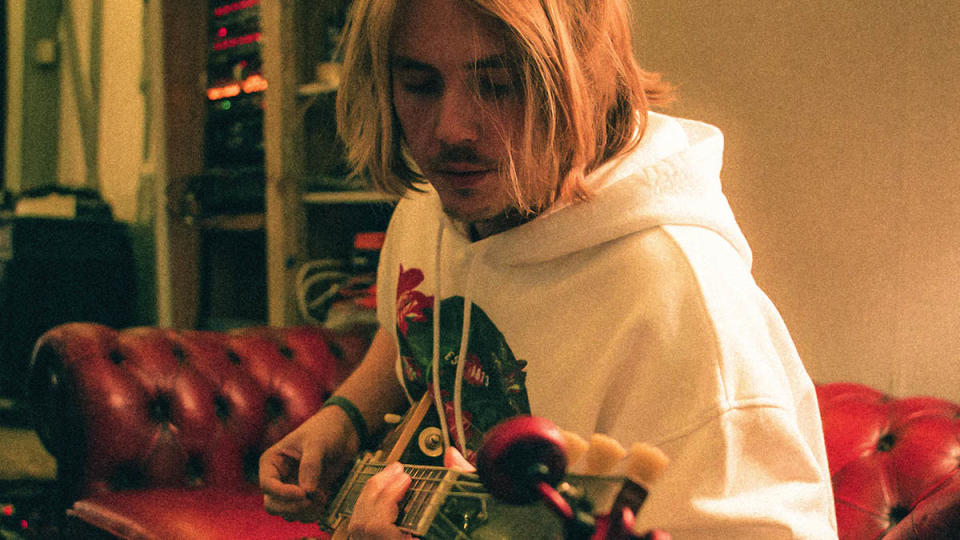“How far can we push the prog, without sounding like it’s a cliché of a prog album?”: Nothing But Thieves are one of the UK’s breakout guitar bands – but their tonal tastes are anything but conventional

- Oops!Something went wrong.Please try again later.
Not many bands hit their fourth album still on an upward trajectory, but Nothing But Thieves are still climbing. After headlining London’s O2 Arena for the first time on the back of 2021’s Moral Panic, they’ve entered the UK album chart at #1 for the first time with latest effort Dead Club City.
It’s an album that finds the band incorporating more synths as they flirt with dance and hip-hop grooves, but it’s also a concept album that takes cues from Rush and ELO. Guitarist Joe Langridge-Brown calls it “retro-futuristic”, and it proves the band can get more creatively ambitious and expand their audience at the same time.
In an era of squeezed budgets, it’s increasingly rare for a band to have the luxury of time to make an album, but by recording closer to home with guitarist/keyboardist Dominic Craik co-producing, Nothing But Thieves gave themselves room to experiment. “Previously we’ve worked with Mike Crossy in LA,” explains Dom. “We would pitch up there for like six, seven weeks, and your deadline was your deadline.”
Joe agrees. “We’d got stuck in a pattern where if something didn’t go our way in the studio and we wanted to re-record, that was just tough. This allowed us to experiment. We recorded one song, City Haunts, I think five times, chasing something we felt we’d lost. In previous projects, maybe that would have been lost forever.”
Giving themselves room to create a concept album risked sounding self-indulgent, an accusation they’ve dodged by keeping the average song length under four minutes. Said Joe: “That was a conversation this year: ‘How far can we push the prog, without sounding like it’s a cliché of a prog album?’” Lead track Welcome To The DCC is enhanced by a Taurus synth bass inspired by Rush’s Geddy Lee. “It does this kind of crazy monophonic rumble thing that you can’t get from anything else,” grins Dom.
“ELO’s Time was an album listened to a hell of a lot,” Joe continues. “They were doing a lot of early vocoder stuff, which we experimented with. The whole thing is trying not to be pastiche about it, making it relevant and feel like an album that’s made now, but it being influenced by that stuff.”
Incorporating synths into rock is a path fraught with danger, and, as producer, Dom was careful to do it without compromising their identity as a guitar band.
“If you follow a similar signal path with the synths as you do with the guitars, you’re able to have them live more harmonically and cohesively together,” he explains. “I rarely record a synth that isn’t going through some sort of distortion. It can go from light saturation, creating more harmonic overtones in the top end, to fully choked out. I use a Thermionic Culture Vulture. Distortion can be your friend when trying to sit synths with more organic instruments.”
Doubling guitar parts with synths helped with this balancing act. “On something like Welcome To The DCC, there’s a synth bassline layered with the guitar,” Joe says. “That meant that it didn’t feel like a massive departure for the band. There was an inherent rock quality that was still in these songs that were very different-sounding.”
The marriage of synth and guitar was helped by his latest gear purchase. “I started playing guitar because of All My Life, the Foo Fighters song. In the video, Dave Grohl is playing this Plexiglas Dan Armstrong guitar. This was the year I said, ‘I think I’ve finally earned my stripes enough to warrant buying one.’ It’s not wood, so it has a very different tonal quality, more synthy than normal guitars. That really factored into the other synth work.”
Elsewhere, Joe was using his mini-humbucker-equipped ’70s Gibson Les Paul Goldtop and a Gretsch Panther. A Danelectro and a 12-string Strat also saw some action. Dom’s main guitar is a rare Dicky Betts signature Gibson SG.
“It’s one of those magic guitars,” he raves. “I’ve tried so many other SGs and it’s just not the same. We do a lot of back-to-back comparing guitars, tracking five playing the same part to get an idea what’s sitting right. That one’s normally hard to beat. It’s really high-output, and so midrange forward that you don’t really have to try too hard to get it voiced in a mix. We were also using a ’70s Jag for jangly single-coil sounds, anything that needed more articulation on the picking.”

As for guitar amps, the band hardly used any, but are not exactly forthcoming about what they used instead. “It’s quite nice – we haven’t had gear secrets before,” Dom smiles knowingly before Joe adds: “There’s one or two things, pedal and preamp-wise, that are the sound of the album. I’ll tell you what, when we discover something else that’s really good, we’ll let you know these secrets!
“One of the reasons that we ended up with Dom producing the record was because the demos had these direct preamp tones. To change it seemed to change the vibe of the demos too much.”
Despite not spilling the beans on the specific gear, Dom does explain the main signal chain. “Most of the starting points are a humbucker guitar into a multi-band distortion pedal, into a preamp, into an EQ. The EQ bump normally wants to be in between 900 Hertz and 1.3k. It just sounds cool as fuck. A lot of my favorite bands from Queens Of The Stone Age through to T. Rex have a lot of quite honky humbucker tones. That’s where some of the ’70s influence comes in on the guitars.”
There are no speaker emulations, surprisingly, just the EQ’d direct guitar sounds. “The EQ is more additive than subtractive,” Dom says. “It’s usually taken as far as we can go without it sounding silly, so we’ll max out and then pull it back. On this particular preamp there’s a top-end shelf that you can bump up.
“You want to hear it just poking its head out above the bass, between the cymbals and the snare. We actually stopped using a lot of cymbals on this record. That helps give visibility to the guitars and lets them do heavy lifting in sections that would usually be relying on hihats, crashes, and rides to get that lift. We were orientating that for more of a guitar-focused thing this time.”
Nothing But Thieves’ refusal to reveal their gear reminds us of fellow Essex rockers Nova Twins, who are equally stubborn about their tone secrets. Dom laughs as he recalls a recent gig where the two acts played together and he observed Novas bassist Georgia South in action. “I saw Georgia’s ’board, or what I presume are pedals underneath tape and re-housing and all sorts of shit. She literally has it covered up for the cameras as well. It’s amazing.”

Surely there must be some gear they can show us? Dom begins producing pedals from a studio shelf. “This didn’t get used once,” he laughs, holding up a Boss DS-1. He then produces a GE-7 (“one of the best pedals of all time”), and an RE-20 Space Echo: “This is really good if you don’t know how to get out of one section and get into the next one. You just hold down the self-oscillate pedal and that’ll do it!”
Finally, he lands on the Game Changer Audio Plasma. “This one got some use. You can blow out the bottom-end pretty mad on this thing, and it’s got a bolt of lightning running through it. What’s more rock ’n’ roll than that?”
New tones gave the band the chance to try new styles as well. “We never wanted to be a band that stagnated,” claims Joe. “Maybe we overdid that in the early albums. There’s a lot of flitting around different genres, but it meant our fans expect something different. It’s actually very nice when you’re in the studio.”
They took advantage of that to indulge some Brian May-like composition techniques. “For the solo in Foreign Language there was a lot of interlocking harmony parts happening. That’s a fun day in the studio!”
That was far from the only such excursion. “There’s a song called Do You Love Me Yet? which starts a bit like an ABBA tune, with a distorted Rhodes, and it goes off into this weird Queen odyssey thing,” Dom enthuses. “That has a load of harmony guitars interweaving. There were those moments that we were trying to inject, where it didn’t sound too indulgent or stupid. Just a little nod to some of that kind of fun experimentation that used to happen way more frequently.”
There’s more music out there than ever and you’ve got to be quality to survive
While Nothing But Thieves continue to conquer new worlds, young rock bands are having a tough time conquering the UK mainstream. What made them break through?
“We were talking about this the other day,” muses Joe. “We came up in a very short but definite era of bands in the UK. There was Royal Blood, Wolf Alice, Slaves and us that came out in the same couple of years and managed to have some longevity. Then it became difficult.”
“I don’t think the output has dropped in quality. There’s more music out there than ever and you’ve got to be quality to survive,” Dom reflects. “We’ve always tried to write the strongest songs that we can. There’s an element of luck with it as well. So it’s hard to know, but we’re definitely grateful for it.”
Dead Club City is out now via AWAL International.

